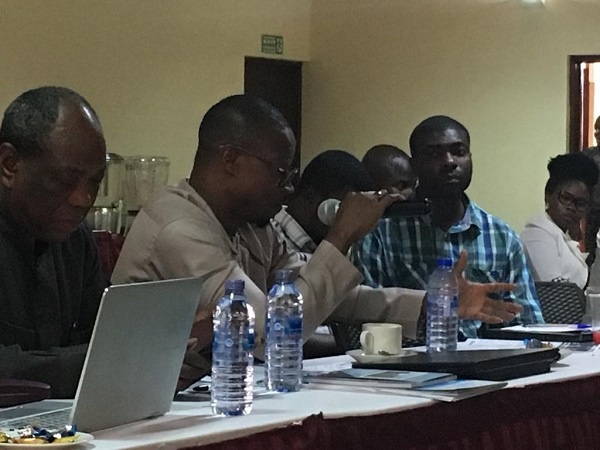 Resources persons sharing their knowledge at the engagement session
Resources persons sharing their knowledge at the engagement session
Water and Sanitation sector NGOs, IRC and WaterAid have engaged stakeholders on district-based initiatives focused on building and strengthening strong local systems in delivering safe and sustainable Water, Sanitation and Hygiene (WASH) services in Ghana.
The first National Learning Exchange themed, ‘Strengthening Local Government Systems to Deliver Safe and Sustainable WASH Services’ brought together decision makers in selected District Assemblies, local government actors and NGOs to share knowledge on WASH related issues.
The session saw stakeholders in the WASH sector advance better understanding of various district-focused approaches and how governments and partners are performing their roles in supporting the provision of WASH services in different context.
The forum aimed at generating recommendations for strengthening local systems for improved service delivery towards achieving the WASH SDGs.
Some district assemblies, particularly the Asutifi North District in the Brong Ahafo Region and the Bongo East District in the Upper East Region, had the opportunity to present their implementation plans for WASH projects for review and the way forward.
They also brought to bare the progress of work and challenges they are facing in executing WASH master plans in their various districts.
Ghana has done little in addressing WASH issues - Sanitation Ministry
Speaking at the event, the Director of Environmental Health and Sanitation at the Ministry of Sanitation, Anthony Mensah bemoaned Ghana’s inability to handle water and sanitation issues properly.
He reiterated that Ghana’s name is among poorly performing countries in Water, Sanitation and Health (WASH) globally because of the insufficient effort by governments in tackling issues in the sector.

He said, efforts by previous governments to redeem Ghana’s image yielded little result, hence, sustainable WASH implementation plans must be designed and enforced by the current regime toward achieving the Sustainable Development Goal (SDGs) 6.
“Over the few years efforts that have been put in place have delivered some marginal results… For example, access to proper sanitation has gone up slightly from 15% to about 21%. It’s not too good but it’s something that we can be happy about and inspired by so that we can be able to assemble resources going forward. Open defecation has fallen to about 21 per cent now,” he noted.
He added, “All these said and done, government needs to put in more resources and equally the partners also have the responsibility to support government to achieve the SDG 6.”
Mr. Mensah further commended IRC and WaterAid Ghana for empowering the district assemblies, who are responsible for executing the Sanitation Ministry’s projects at the district level.
“The MDGs era came to us and now we’re in the SDGs era which is even imposing much more requirements on us and, therefore, we’re supposed to be doing much better. We’re aware that the assemblies are responsible for the implementation of policies formulated by the Ministry of Sanitation and Water Resources and if the assemblies can effectively deliver, their capacities need to be built,” he stressed.
He is optimistic the collaborative effort by IRC and WaterAid will help build the capacities of the district assemblies towards the achievement of the SDGs 6 and making Ghana one of the cleanest cities in the world.

He urged representatives of the various assemblies to take the capacity building programs serious and apply whatever knowledge they gain in solving sanitation problems.
He also advised the districts to team up and assist each other in tackling issues impeding the attainment of their WASH master plans.
“If you look at the WASH sector, the diseases transmission organisms know no boundaries at all so if you’re in district A and you say well, I’m doing my best so I’m not bothered about the other districts, you’re deceiving yourself. There’s the need for all the assemblies to have their capacities built so that they will all be able to handle the issues effectively so that they’ll be able to battle the challenges associated with sanitation,” Mr. Mensah emphasised.